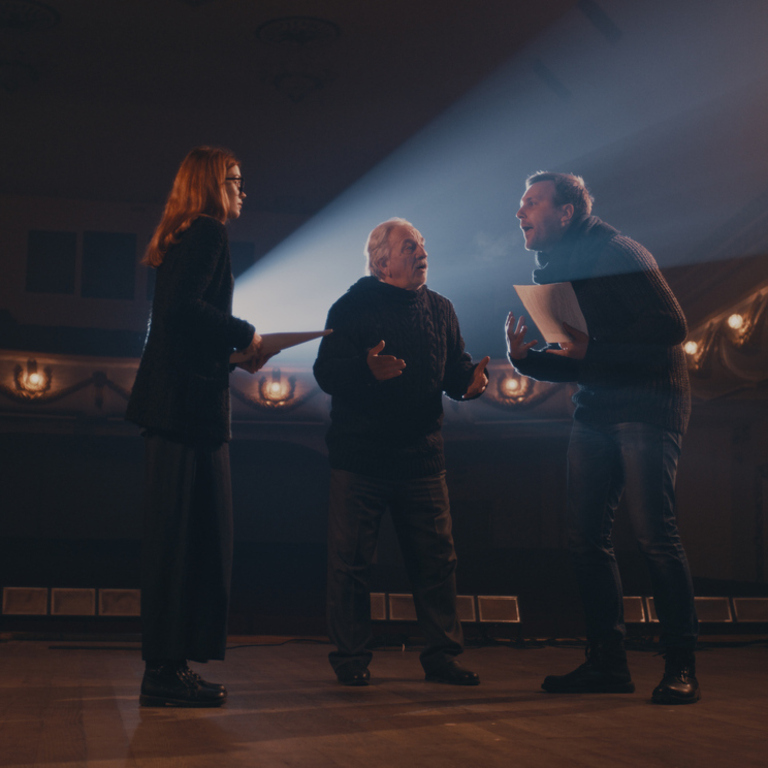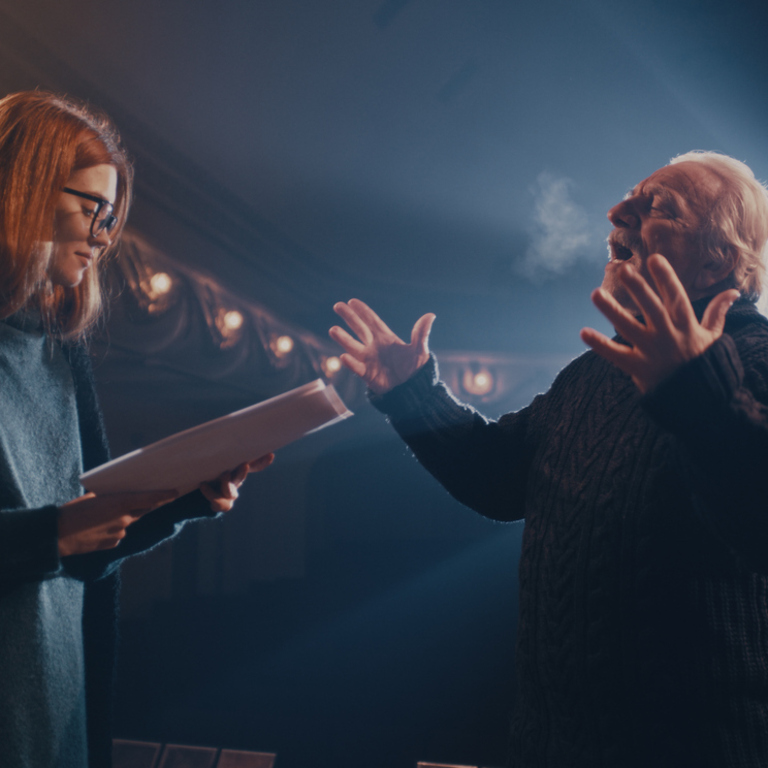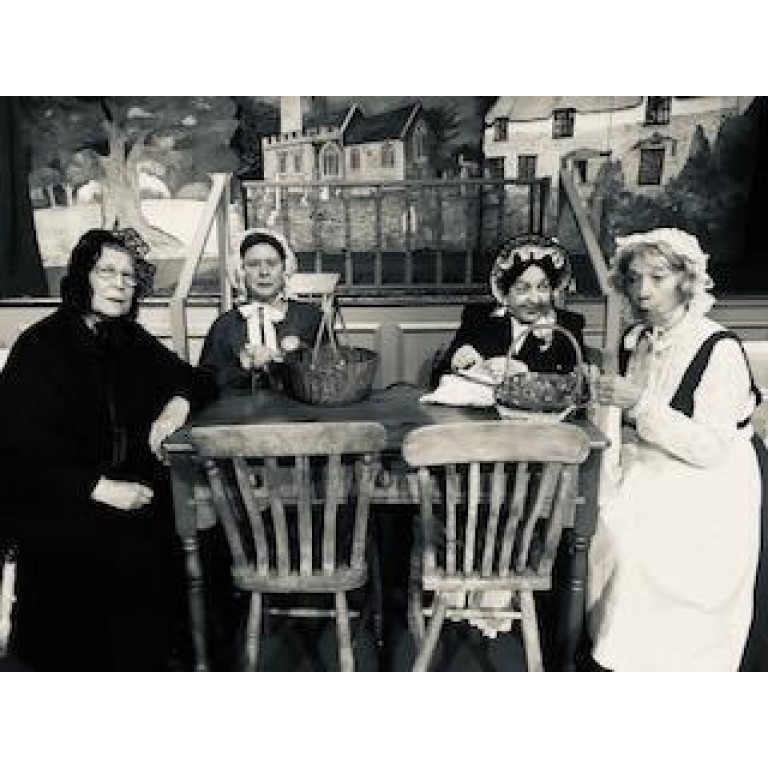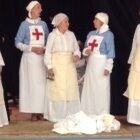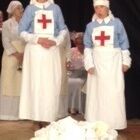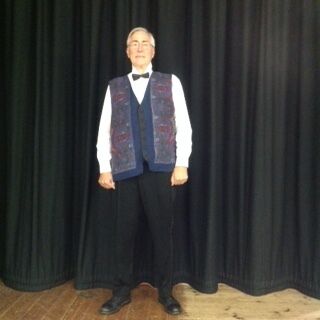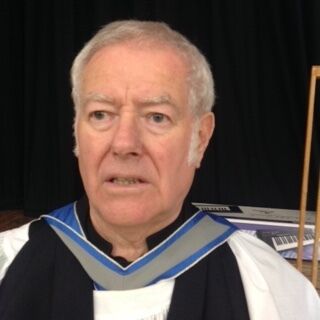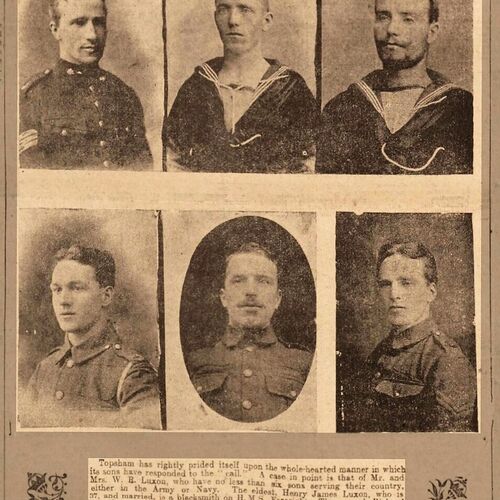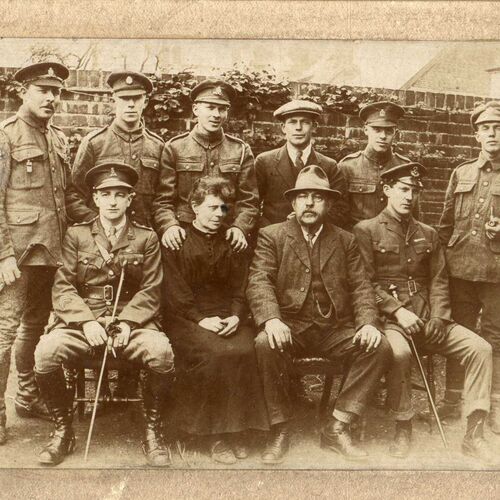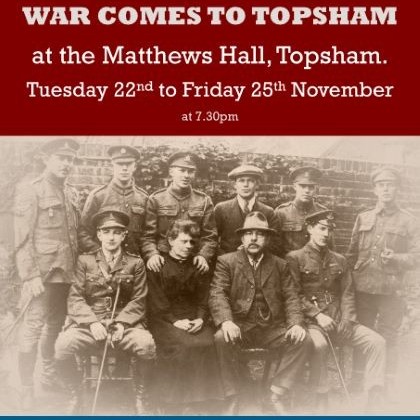
posted 7th July 2025
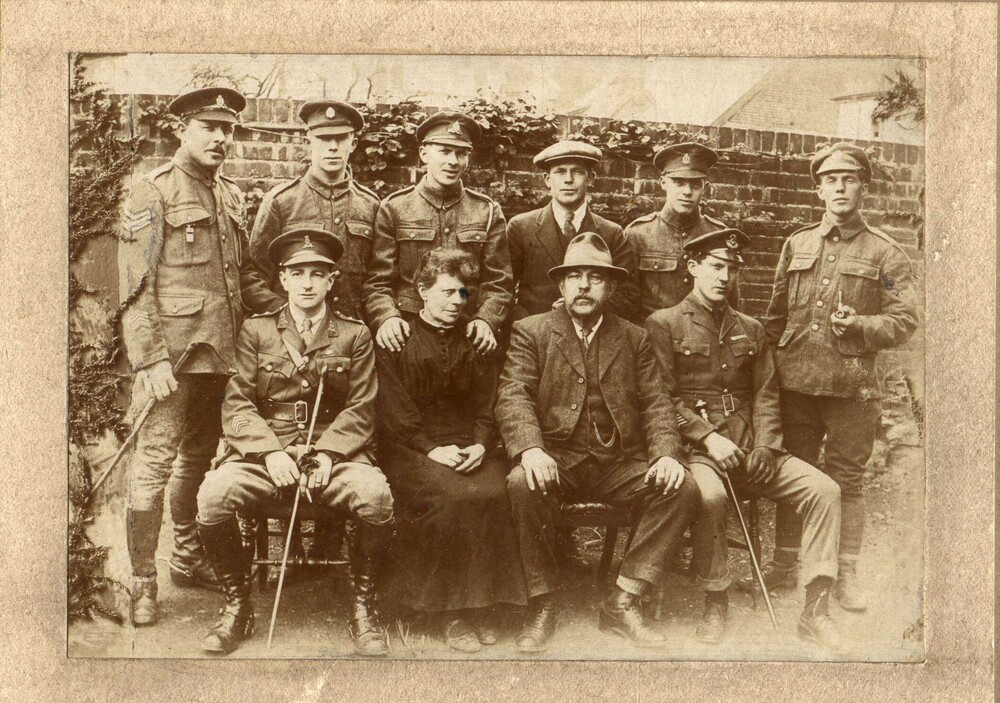
May We Remember: War Comes to Topsham
It is nearly two years since Estuary Players and Topsham Museum Society decided to collaborate on a project to celebrate the centenary of the First World War. The Museum immediately set about applying to the Heritage Lottery Fund for a grant to mount a major exhibition, to be called War Comes to Topsham, and an associated drama performance. The grant enabled the Museum to complement its own substantial archives by undertaking considerable new research, at the National Archives and elsewhere; at that stage we had no idea of what the contents of either the exhibition or the show would be.
The fruits of that research could be seen at the exhibition War Comes to Topsham, which ran at the museum for the whole of the summer. Some of it has been relocated to our foyer for the run of the play. The exhibition documented all who fought in the services from Topsham, whether they survived or not, but one family in particular drew the attention of Estuary Players as a possible focus for the dramatic representation of the period. The Mays (seen in the image here) were a large, and seemingly prosperous, family who ran a market garden. Their activities were well documented, they were active in the amateur theatre of the time, the eldest son, George, kept an exhaustive diary of his time with the Royal Artillery in India. All the men joined the forces, all survived, and because they fought in different units, in different places, they represented an opportunity to survey the war beyond the trenches in France.
The Mays in our play are not facsimiles of the real family – we don’t know much about their actual characters or opinions – but we know what they saw and read and heard, and in the play they talk about it among themselves and compare it to the situation 25 years later. There is much dramatic licence, but we like to think that truth remains even when accuracy is impossible.
With the exception of the quotations from George’s diary, all the May dialogue is invented – although all the facts they refer to are true. The music hall sketches likewise have been created to serve the play, along with the three spoof Gilbert and Sullivan songs. Nearly everything else however is taken verbatim from the original sources. All the songs were current during the war, although Florrie Majorfield and Shapter and Strand are pure invention. The exception is George Formby’s Five and Twenty Years, which is playing in 1939 as the show starts – it was about two years old by then. The two poems were contemporary, and the words of the Rev Halliday, Crown Prince Ruprecht, the Headmaster, the Journalist, and the various soldiers are all genuine. Lord Derby’s speech is not however a direct quotation, but is made up from views and comments at the time.
This play would not have been possible without the remarkable efforts of the Topsham Museum researchers, and in particular Rosemary Hatch, Marian Grimshaw and Catriona Batty, who have ferreted out huge amounts of information, which has been distilled into the two hours of our show. We couldn’t get it all in, and our apologies to them for that, but we hope that we have represented both their work and the reality of Topsham between 1914 and 1918, and that you, the audience, will go away tonight knowing and understanding more about the First World War than you did when you came in…and that you have been well-entertained in the process!
Cast and Crew
George May Bob Drury
Henrietta May (Het), his wife Chris Eilbeck
Margaret May, his sister Rose Gander
Ernest Tremlett, her husband Alan Caig
Ralph May, brother of George Ian Potts
Barbara May, his neice Marie Watsham
Leslie May, another brother Rob Hole
Sarah May, his wife Hilary Francis
Florrie Majorfield, star of the Halls Clare Philbrock
Shapter and Strand, double act Keith Palmer and Howard Eilbeck
Lord Kitchener Howard Eilbeck
Rev Halliday, Vicar of Topsham Bill Pattinson
VAD Nurses Hilary Francis, Rose Gander, Chris Eilbeck
Ironing Ladies Cally Pettit, Jacquie Howartson, Avril Pattinson
Private Cox Howard Eilbeck
Lord Derby Bill Pattinson
Dick “Pincher” Pym Keith Palmer
Seven Jolly Sailors Howard Eilbeck, Keith Palmer, Bob Drury, Bill Pattinson, Alan Caig, Ian Potts, Cass Thorne
Crown Prince Ruprecht Keith Palmer
Private Soldier 1 Keith Palmer
Private Soldier 2 Howard Eilbeck
Officer Alan Caig
Journalist Jacquie Howartson
Headmaster Ian Potts
Pub customers etc Cally Pettit, Cass Thorne, Lynn Trout
Devised and written by Alan Caig and Janine Warre
Original research by Rosemary Hatch and Marian Grimshaw
Picture research by Catriona Batty
Director Alan Caig
Production Co-ordinator Janine Warre
Musical Director Mark Perry
Assisted by Mary Pickard
Set and Publicity design Phil Keen
Lighting Peter Tapp
Film Rhod Cooper
Projection Rhod Cooper
Costume co-ordination Janine Warre
Wardrobe Jill Whitehouse
Front of House Avril Pattinson and team
Bar and Catering Facilities The Lighter
Review
by Bryan Stephenson
It’s long been a tenet of British culture that the worst in life can be rendered bearable through humour. Estuary Players’ latest presentation was just such a manifestation in the recollection of the time when ‘War came to Topsham’. The far end of the Matthews Hall was transformed into the bar of a Topsham pub, with the stage of a music hall immediately alongside and the whole venue, audience included, was transposed temporarily to 1939. In this neatly contrived, dual-function setting four couples of the May family met in this bar to engage in a double mix of 1st World War reminiscences interrupted by anxious forebodings at the prospect of another impending conflict. From their recollections, some light-hearted and some sad, sprang further connections which used a variety of film, songs, poetry, diary excerpts and sketches to fill out either the international context or aspects of wartime life in Topsham. On the pub wall, above the heads of the May family, a projection screen carried a succession of images: battlefield scenes, public information notices (especially on food rations), propaganda and recruitment posters. With ‘front of house’ staff in appropriate costuming the ensemble approach made for an easy ‘we’re all in this together’ atmosphere.
Audience attention was switched throughout the performance between the gentle teasing and family banter of the Mays and the adjacent stage, where a versatile duo of cheeky chappies, Shapter and Strand (Keith Palmer and Howard Eilbeck), performed their subversive songs and sketches with skill and panache. On that same stage, with a splendidly composed presence, appeared Florrie Majorfield (Clare Philbrock) to deliver patriotic and sentimental songs, accompanied at the piano by Mary Pickard. The music hall items included adaptations from Gilbert and Sullivan, providing unlikely but very amusing song and dance routines from ironing ladies, VADs and sailors. There were solo cameos too: a deliciously refined Topsham headmaster (Ian Potts) read from the school logbook some of the records of fruit picking forays and, regretfully, of agricultural absenteeism. The Vicar of Topsham (Bill Pattinson) pontificated to his flock, most especially on the virtues of generous giving.
The account above is a fair sample of content in a dramatic enterprise which was ambitious and brave. Its foundation was provided in the original research undertaken by Rosemary Hatch, Marian Grimshaw and Catriona Batty for the earlier Topsham Museum exhibition. Upon their achievements Alan Caig and Janine Warre constructed a dramatic entertainment of which any writer, director or company of actors could be proud. Necessarily there were complexities, some obvious but others more subtly demanding. Thus the doubling up in the cast required slick changes, which were well-managed. So too generally were the switches from one format to another. The gentle interaction of the pub scenes was more taxing for the actors than might have appeared, both in the pace of the dialogue and in the challenge of projecting to the back of the auditorium whilst articulating thoughtful reflection.
And the abiding memory? That an amiable family, accustomed to the quiet and gentle tempo of the seasons, should be torn from Devon soil and thrown into the cruelty of battle and the privation of war. Remarkably all the eight May boys came back, when so many, many others did not.
B.S.
May We Remember: Notes on the Music and Poetry
Five and Twenty Years
Mary Pickard Written by Formby, Gifford, Cliffe, and performed by George Formby Written by the team that wrote When I’m Cleaning Windows, and recorded on the same day in 1936.
Your King and Country Need You
Florrie Majorfield
Words by Paul Pelham, music by Wallis and Elton
Published in 1914, half the profits went to the Prince of Wales National Relief Fund. Not to be confused with the more famous Your King and Country Want You, or We Don’t Want to Lose You.
They Were All Out of Step But Jim
Florrie Majorfield
Words and music by Irving Berlin. The best known version is by Billy Murray
Published in 1918, it concerns recruiting in the US after it joined the war, but is relevant to the British experience too.
The Last Long Mile
Shapter and Strand
A song by Emil Breitenfeld with a different tune and similar words appeared in an American revue called Toot Toot in 1917. A bit of a mystery. This version comes from a collection of soldiers’ songs (cleaned up a little) known as Tommy’s Tunes published in 1918 by a serving officer.
An Ironer’s Lot and Three Little VADs
The Ironers and the VADs
Adapted from Gilbert and Sullivan: An Ironer’s Lot by Alan Caig, Three Little VADs by Clare Philbrock
G&S operetta was at the height of its fame before the war; there were nearly 1,000 amateur performances in Britain in 1914, and it has been suggested that the urge to perform G&S effectively established the amateur theatre movement.
We Sail The Ocean Blue
The Gentlemen of the Company
Adapted from Gilbert and Sullivan by Alan Caig
The May family were eager participants in amateur theatre, and Ernest Tremlett was the musical director of Topsham Amateur Theatre Society before the war.
The Lads in Navy Blue
Florrie Majorfield
Words and music by Harry Dacre. Performed on record by Harrison Latimer and Robert Howe.
Probably written at the end of the 19th century, but released on record to capture the patriotic fervour of 1914.
Down in the U-17
Shapter and Strand
Words by Roger Lewis, music by Ernie Erdman. Recorded by Billy Murray.
Another American song, dating from 1915, the cover describes it as a “musical torpedo”. An unusual piece.
When We’ve Wound Up the Watch on the Rhine
Florrie Majorfield
Words by FW Mark, music by HE Darewski.
From the 1914 revue Business As Usual at the London Hippodrome. Darewski’s other songs include Sister Susie’s Sewing Shirts for Soldiers.
Lloyd George’s Beer
Shapter and Strand
Words and music by RP Weston and Bert Lee. Recorded by Ernie Mayne.
Weston and Lee also wrote I’m Enery the 8th and Paddy McGinty’s Goat. Weston wrote the words to Sister Susie. Lloyd George’s Beer dates from 1915.
Daddy’s In the Dardanelles
Florrie Majorfield
Words by Chas. Ridgeway, music by Roger Cameron.
Written in Australia in 1916, and described on the front as a “stirring patriotic story ballad”.
Half Hours in Helles
Strand
Poem by AP Herbert, the dedication to his book of poetry of the same name.
Herbert fought with the Royal Naval Division at Gallipoli, and later on the Western Front. This is first hand poetry.
I’ve a Bit of a Blighty One
Florrie Majorfield
Words by Arthur Wimperis, music by HE Darewski. Made famous by Vesta Tilley
Originally written in 1918, for the revue As You Were. “Blighty” derives from the Urdu vilayati, meaning foreign, and, in the context of British India therefore, England.
In Memoriam
Poem by Ewart Alan Mackintosh, from A Highland Regiment and Other Poems.
Written after a raid on German trenches in 1916 in which Pte David Sutherland was killed. Mackintosh received the MC for the same action. He himself was killed the following year at Cambrai.
We’ve Had No Beer
Strand
Words unknown, music Eventide by William Henry Monk, later used as the tune for Abide With Me
A typical soldiers’ spoof of a well-known tune. Also known to the tune of Lead Kindly Light
Mademoiselle from Armentieres
Traditional
The tune is said to be from a bawdy French original about an innkeeper’s daughter and two Prussian officers (which became Three German Officers Crossed the Rhine), taken up by the allied troops in the trenches. There are thousands of verses









